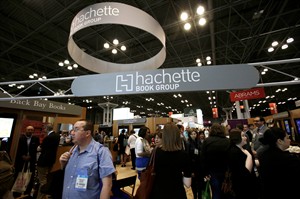Elevate your local knowledge
Sign up for the iNFOnews newsletter today!

NEW YORK, N.Y. – Stephen King, Nora Roberts and Donna Tartt are among the hundreds of authors who have added their names to an online letter criticizing Amazon.com for restricting access to works published by Hachette Book Group.
The letter, initiated by Hachette author Douglas Preston, urged Amazon to resolve its standoff with Hachette over e-book prices and other issues. Readers were asked to email Amazon CEO Jeff Bezos at jeff@amazon.com and “tell him what you think.” Amazon has slowed delivery on books by Preston and other Hachette authors, limited discounts and removed pre-order tags for upcoming releases.
In a telephone interview Thursday, Preston said he was receiving so many emails of support that he felt like “a data entry clerk.” Known for such thrillers as “Blasphemy” and “The Codex,” Preston said he admired Amazon and appreciated how many of his books have sold through the online retailer. But he objected to Amazon’s “scorched earth tactics.”
“A lot of pain is being inflicted on innocent third parties,” he said, referring to authors whose books have been affected.
Preston’s next book, “The Lost Island,” is a collaboration with Lincoln Child that comes out in August. Only the audio edition can be pre-ordered.
“Our focus for years has been to build a bookstore that benefits authors and readers alike,” read a statement issued Thursday by Amazon. “We take seriously and regret the impact it has when, however infrequently, a terms dispute with a publisher affects authors. We look forward to resolving this issue with Hachette as soon as possible.”
Other authors endorsing the letter, which appears on http://www.prestonchild.com/storage/med/preston/220_AmazonStatement.pdf ., include James Patterson, Andrew Solomon and Scott Turow. Some on the list are Hachette writers, but many are published by rival companies. The authors include bestselling novelists such as King and Roberts, prize-winning historians such as Robert Caro and Taylor Branch, children’s authors Laurie Halse Anderson and Mary Pope Osborne, Pulitzer Prize winner Tartt and memoir writers Elizabeth Gilbert and Mary Karr.
“We’re in this for the long haul, as Amazon may well be, too,” Preston said.
Meanwhile, bestselling science fiction author Hugh Howey has written a petition addressed to readers that praises Amazon for offering low prices and for paying generous e-book royalties — as high as 70 per cent, compared to the standard 25 per cent from traditional publishers — to authors published by Amazon. Howey, who has had great success selling e-books through Amazon, has been a leading defender of the Seattle-based company and an advocate for self-publishing.
“You probably aren’t aware of this, but the majority of your favourite authors can’t make a living off their book sales alone,” reads the petition, which can be found on https://www.change.org/petitions/authors-to-thank-our-readers-2 and is supported by J.A. Konrath and other popular Amazon writers.
“Very few authors could when New York Publishing was in charge. That is changing now that Amazon and other online retailers are paying authors a fair wage.”
Preston may be the leader of the current round of Amazon criticism, but he emphasized that he did not support a boycott and that he hoped the dispute would be resolved “in a friendly way.”
Just the other day, he bought some computer equipment from Amazon.
“I’m an Amazon Prime member and plan to remain so,” he said.
Want to share your thoughts, add context, or connect with others in your community?
You must be logged in to post a comment.